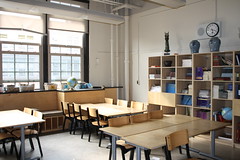With the end of the school year just around the corner, students at Ross Global Academy are eagerly awaiting the start of summer. But some families face uncertain futures when the academy permanently closes its doors at the end of the month.
The New York City Department of Education announced the closure the charter school on East 11th Street at First Avenue in December, citing the reports of the school’s low test scores and high teacher turnover.
With the announcement, parents and staff fought to keep the school open. The school’s founder, multimillionaire Courtney Sale Ross, sent a letter to the Department of Education asserting that the Department did not follow proper procedures and requesting a renewal. Chancellor Joel Klein denied the request.
Richard Burke, executive director of the school, said that the Department has promised to place everyone by the end of the month. But some parents, still bitter about the circumstances of the closure, are angry about the reassignment process.
“We’re displaced,” said Noemi Hernandez, president of the academy’s Parent-Teacher Association. Ms. Hernandez said that although she lives in the neighborhood, she cannot register her two children at local schools without Department of Education approval.
“The Board of Ed said they would help us,” she said. “They haven’t helped us do anything. Nothing. They closed our school, they took away our resources, they took away our kids’ education and they left 400 parents in limbo.”
In an e-mail message, Matt Mittenthal, press secretary for the Department, said, “We understand that families are anxious about next year, which is why we’ve worked to create a separate process just for families at Ross Global. Those families will be notified very soon of their placements.”
Parents are concerned that they may not receive assignments until August and that when their children are placed, it will be in zoned schools with inadequate facilities and instruction.
“The vast majority of kids are going to be thrown into schools that are overcrowded and don’t have anything like this,” Mr. Burke said, referring to the modern facilities put in as part of a $3.5 million building renovation.
The school originally opened in the Tweed Courthouse building in 2006 and moved to the East Village in 2009 — a factor that some of the school’s supporters argued contributed to the low performance ratings.
According to Mr. Burke, 20 to 30 current academy students won spots in other charter schools through the competitive lottery system. A lot more students entered the lottery but were not selected, he said.
Glenda Drain, a Brooklyn resident, has a daughter at the academy and she intended to enroll her younger son in kindergarten at Ross next year. When the closure was announced, she scrambled for other options but said she already missed the deadline for the lottery for another school.
“He lost his spot and now I’m in limbo with him,” Ms. Drain said. She is considering enrolling her son in a daycare and delaying school for a year.
Some students are opting out of the public system entirely. Ms. Ross contributed $50,000 to a scholarship for students from the academy who enroll in private schools and at least ten families have applied for the funds.
Academy teachers and staff are also looking for new opportunities. The school hired a human resources consultant to provide guidance on resume writing and interview skills.
Of the 68 staff members, Mr. Burke estimates about half have already found employment. “We want 100 percent but it’s not 100 percent yet so we’re still working on it,” he said. “A lot of schools hire during the summer.”
Despite the uncertainties for the future, teachers and students are focused on ending the year on a high note. The school implemented programming called SMART — an acronym which stands for Students Meeting And Reaching Their Targets — to ensure that students are prepared for the next year.
“We really kept the instruction and curriculum very rich and very engaged with an intense attention to making sure the kids were prepared when they left this school,” Mr. Burke said.






